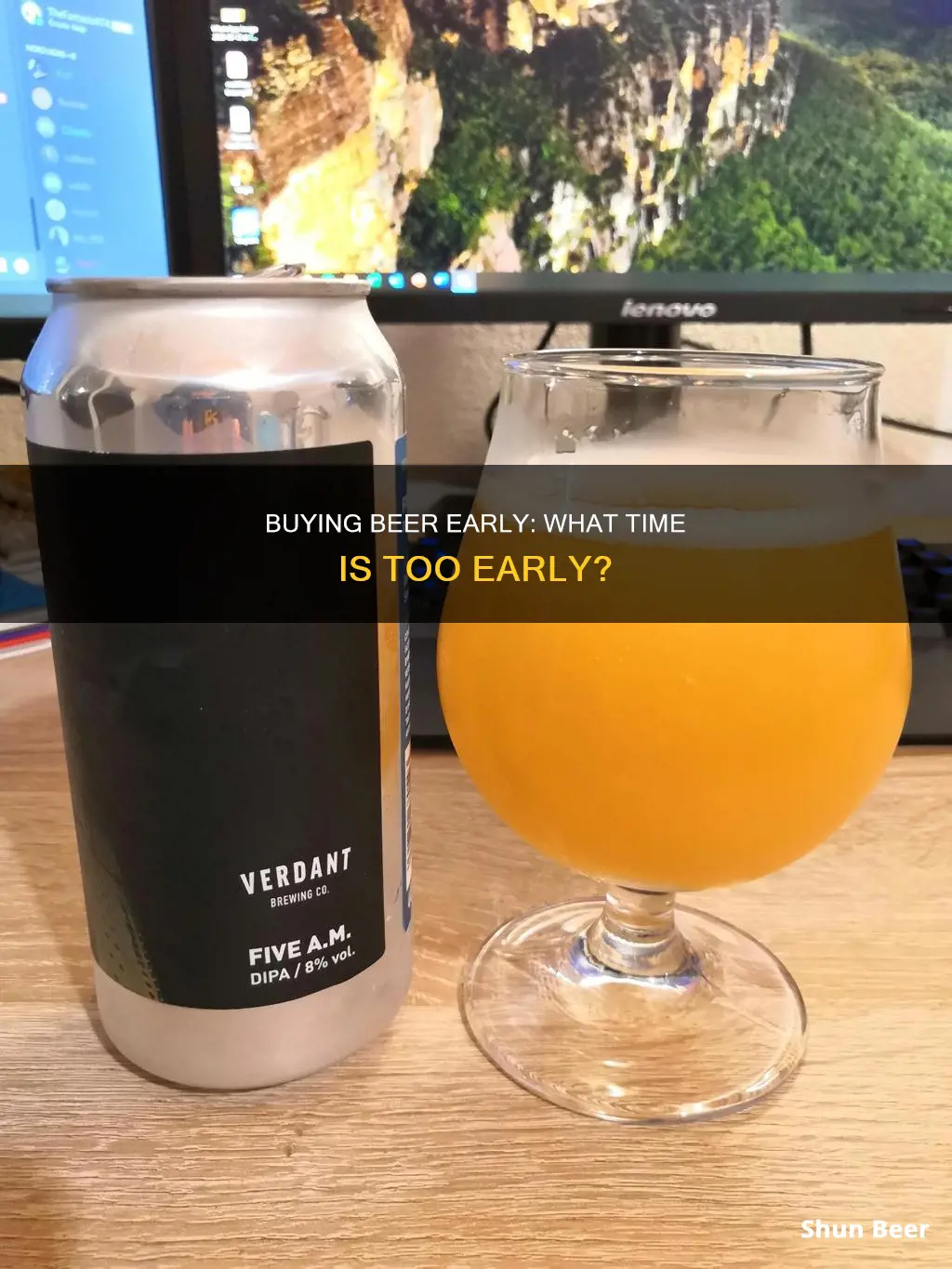
The sale of alcohol is governed by a complex system of federal, state, and local laws in the United States. While federal alcohol restrictions apply to all states, local laws can vary widely from county to county, and even from city to city. These laws dictate the days and hours that alcohol can be sold, as well as the type of alcohol and the business selling it. For example, in Michigan, the sale of alcohol for on-premises and off-premises consumption is legal from 7 a.m. to 2 a.m. Monday through Saturday, and from noon to 2 a.m. on Sundays. In New York City, the New York State Liquor Authority allows liquor/wine stores to sell alcohol until midnight Monday through Saturday, and only from noon until 9 p.m. on Sundays. Grocery stores and drug stores cannot sell beer on Sundays from 3 a.m. until noon. Therefore, whether or not you can buy beer at 5 a.m. depends on where you are located.
What You'll Learn

Beer buying laws vary across US states
Beer buying laws vary significantly across US states, with some states having more lenient laws than others. The 21st Amendment of the US Constitution gives individual states the power to regulate the sale of beer and other alcoholic beverages. Many states restrict the times of day when retailers can sell beer, and these laws can change at any time.
For example, in Mississippi, you can only buy beer between 10 am and 10 pm from Monday to Saturday. Beer sales are prohibited on Sundays and Christmas Day. In Alabama, beer and wine are not controlled by the state, but spirits are. On and off-premise liquor sales are limited to 2 am on Sundays. Beer and wine can be sold in supermarkets, but spirits cannot. There is a 6% ABV cap on beer sales, and bottles cannot exceed 16 oz.
In contrast, Alaska has no state control over alcohol sales, and beer can be purchased from 8 am to 5 am every day. Arizona also has no state control over alcohol sales, and beer can be purchased from 6 am to 2 am every day, except on Sundays when sales are permitted from 10 am to 2 am.
Some states, like California, have lenient laws about liquor promotion, but counties can restrict sales with local laws. For example, in California, you can buy alcohol from 6 am to 2 am every day, but cities and counties can set additional restrictions.
The hours that a restaurant, bar, or retail store can legally serve alcohol are often determined by the Alcoholic Beverage Control Law ("ABCL"). However, these outer limits can be overridden by the rules of the county in which the establishment is located. Additionally, the Community Board or local municipality may further limit the restaurant or bar's closing hours.
It's important to note that these laws can vary even within a state, as local jurisdictions can pass their own alcohol laws. For example, in Michigan, the sale of alcohol is legal from 7 am to 2 am Monday through Saturday and from noon to 2 am on Sundays. However, one source mentions that in some counties in Michigan, alcohol sales are prohibited before noon on Sundays.
Understanding the specific alcohol purchasing hours in your state is essential to staying compliant with local laws. The laws can be complex and frequently change, so it's always a good idea to check the most up-to-date information for your state or local liquor authority.
Planning a Party: Buying Beer in Bulk
You may want to see also

In some states, beer can be purchased 24/7
The United States has a complex system of federal, state, and local laws governing the purchase and consumption of beer. While federal alcohol restrictions apply to all states, local laws can vary widely.
In some states, such as Florida, Mississippi, and Nevada, beer can be purchased 24/7 in certain counties or municipalities. For example, in Miami-Dade County, Florida, liquor stores are allowed to operate 24 hours a day. Similarly, in Mississippi, while there are restrictions on the days and hours that beer can be sold, coastal casinos provide free alcohol around the clock. And in Nevada, unless you're in a dry township, alcohol sales are permitted at any time of day or night.
However, it's important to note that these laws can change and are subject to local ordinances and jurisdictions. For instance, in Michigan, the sale of alcohol is permitted from 7 a.m. to 2 a.m. Monday through Saturday, and from noon to 2 a.m. on Sundays, but individual counties can opt out of these hours.
To be sure of the specific laws in your area, it's always best to check your local county or state laws, as well as any applicable ordinances or jurisdictions.
Buying Beer Legally: The Age Limit Explained
You may want to see also

In some states, beer cannot be purchased on Sundays
In the United States, the sale of alcohol is governed by a complex system of federal, state, and local laws. While the National Minimum Drinking Age Act, enacted in 1984, prohibits the sale of alcohol to persons under 21, individual states, counties, and cities have the power to regulate the sale of alcoholic beverages further. These regulations include the hours of sale, the type of alcohol, and the day of the week.
In some states, the sale of alcohol on Sundays is prohibited or restricted. This is often due to "blue laws," which restrict certain activities on Sundays, the Christian Sabbath. While many blue laws have been repealed, as of 2019, 28 states still have some form of blue laws on the books.
For example, in Georgia, the default rule is that off-premises alcohol sales are disallowed from 12:30 pm to 11:30 pm on Sundays, unless the local jurisdiction opts into Sunday afternoon sales by referendum. In New York, grocery stores cannot sell beer on Sundays from 3:00 am until noon. Similarly, in Maryland, some jurisdictions, including parts of Baltimore County and Garrett County, prohibit Sunday alcohol sales.
In Indiana, the sale of spirits on Sundays is prohibited, and it is the only state that also bans wine and beer sales on that day unless purchased from a brewery or winery. On the other hand, Tennessee recently began allowing wine sales on Sundays in 2018, recognizing that Sunday was "the biggest shopping day of the week."
Beer Delivery: DoorDash's Alcohol Ordering Service Explained
You may want to see also

In some states, beer cannot be purchased before noon on Sundays
The sale of alcohol in the United States is governed by a complex system of federal, state, and local laws. While the 21st Amendment of the U.S. Constitution gives individual states the power to regulate alcohol sales, many states have enacted additional restrictions on the sale of alcoholic beverages on Sundays, with some prohibiting sales before noon. These laws, known as "blue laws" or "Sunday laws", vary widely across the country and can be subject to change.
In New York, for example, grocery stores and drug stores are prohibited from selling beer on Sundays between 3:00 a.m. and noon. Similarly, in Georgia, Sunday off-premises sales are generally disallowed from 12:30 p.m. to 11:30 p.m., unless the local jurisdiction has opted in to Sunday afternoon sales. In Alabama, while specific counties may vary, alcohol sales are typically prohibited from midnight to noon on Sundays. On the other hand, states like Arizona, which previously restricted Sunday sales, have since repealed these laws, allowing sales from 6 a.m. to 2 a.m. every day.
The variation in liquor laws across the United States can be attributed to the interplay between federal, state, and local regulations. While federal restrictions, such as the National Minimum Drinking Age Act, apply uniformly across the nation, state and local laws can impose additional conditions. For instance, while Arizona may permit sales from 6 a.m. to 2 a.m., individual counties within the state may have more restrictive laws. As a result, it is essential to refer to the specific laws of your state and local jurisdiction to understand the regulations that apply to you.
Bass Beer: Where to Buy and Enjoy It
You may want to see also

In some states, beer can be purchased from 6am to 2am every day
The United States has a complex system of federal, state, and local laws governing the purchase and consumption of beer. While the National Minimum Drinking Age Act, enacted in 1984, prohibits the sale of alcoholic beverages to persons under 21, the specific regulations on when and where beer can be purchased vary across states and even local jurisdictions.
In some states, beer can be purchased from 6 am to 2 am every day. This means that, unless there are more restrictive local laws in place, individuals of legal drinking age can buy beer at any time during this window. However, it's important to note that these laws can change, and it's always a good idea to check the specific regulations in your area.
For example, in Arizona, beer can be purchased between 6 am and 2 am every day of the year. Similarly, California allows beer sales from 6 am to 2 am daily, although cities and counties can impose additional restrictions. Missouri also permits beer sales from 6 am to 1:30 am every day, while Iowa allows sales from 6 am to 2 am on weekdays and 8 am to 2 am on Sundays.
On the other hand, some states have more restrictive laws. For instance, Mississippi generally restricts beer sales to between 10 am and 10 pm from Monday to Saturday, and alcohol sales are prohibited on Sundays and Christmas Day. Alabama also prohibits alcohol sales on Sundays in several counties, and beer can only be purchased from 6 am to 2 am in grocery and liquor stores.
It's worth noting that, in addition to daily and weekly restrictions, some states have special provisions for holidays. For example, Michigan prohibits the sale of liquor after 9 pm on December 24 and all day on Christmas. Understanding the specific laws in your state and local area is essential to ensure compliance with regulations.
The Best Beer-Buying Options in Pennsylvania
You may want to see also
Frequently asked questions
It depends on the state and local laws. Some states, like Alaska, allow beer sales from 8 a.m. to 5 a.m. every day, while others have more restricted hours.
Yes, in many states, beer sales are restricted to specific hours, such as California, where beer can only be purchased from 6 a.m. to 2 a.m. daily.
Yes, local laws can vary within a state. For example, in Michigan, beer sales are allowed from 7 a.m. to 2 a.m. statewide, but some counties have additional restrictions, such as no sales before noon on Sundays.
Yes, in Nevada, stores can be open 24 hours a day, and liquor can be sold in grocery and convenience stores at any hour.
Yes, there are some "dry counties" in the U.S. where alcohol sales are prohibited. For example, 26 out of Alabama's 67 counties do not allow alcohol sales, though possession and consumption are still legal.







